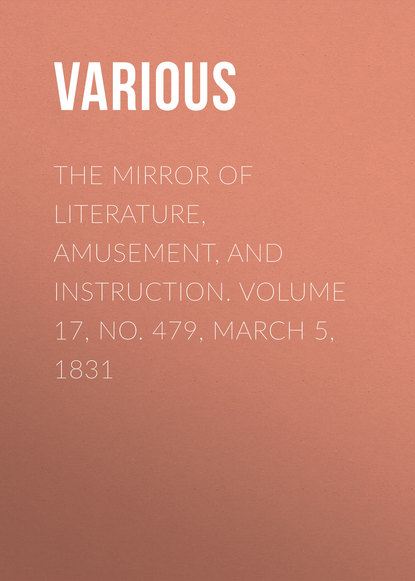По всем вопросам обращайтесь на: info@litportal.ru
(©) 2003-2024.
✖
The Mirror of Literature, Amusement, and Instruction. Volume 17, No. 479, March 5, 1831
Автор
Год написания книги
2018
Настройки чтения
Размер шрифта
Высота строк
Поля
THE GATHERER
A snapper up of unconsidered trifles.
SHAKSPEARE.
SHIP-BUILDING
To give an idea of the enormous quantity of timber necessary to construct a ship of war, we may observe that 2,000 tons, or 3,000 loads, are computed to be required for a seventy-four. Now, reckoning fifty oaks to the acre, of 100 years' standing, and the quantity in each tree to be a load and a half, it would require forty acres of oak forest to build one seventy-four; and the quantity increases in a great ratio, for the largest class of line of battle ships. The average duration of these vast machines, when employed, is computed to be fourteen years. It is supposed, that all the full grown oaks now in Scotland would not build two ships of the line.
Quarterly Journal of Agriculture
THE SHOWER BATH
Quoth Dermot, (a lodger of Mrs. O'Flynn's),
"How queerly my shower bath feels!
It shocks like a posse of needles and pins,
Or a shoal of electrical eels."
Quoth Murphy, "then mend it, and I'll tell you how,
Its all your own fault, my good fellow;
I used to be bothered as you are, but now
I'm wiser—I take my umbrella."
X.Y.Z
THE TOWER OF LONDON
Some of the following inscriptions are to be found in the "Beauchamp Tower."
In the third recess on the left hand is "T.C. I leve in hope, and I gave q credit to mi frinde, in time did stande me most in hande, so wolde I never doe againe, excepte I hade him suer in bande, and to al men wishe I so, unles ye sussteine the leike lose as I do.
"Unhappie is that mane whose actes doth procuer,
The miseri of this house imprison to induer.
"1576, Thomas Clark."
Just opposite the same is
"Hit is the poynt of a wyse man to try and then truste,
For Hapy is he who fyndeth one that is juste.
"T. Clarke."
In the same part of the room between the two last recesses is this, in old English:
"Ano. Dni … Mens. As.
1568 J.H.S. 23
"No hope is hard or vayne
That happ doth ous attayne."
And on the wall on the top of the Beauchamp Tower, are the following lines on a Goldfinch:—
"Where Raleigh pined within a prison's gloom,
I chearful sung, nor murmur'd at my doom,
Where heroes bold and patriots firm could dwell,
A Goldfinch in Content his note might swell;
But death more gentle than the law's decree,
Hath paid my ransom from captivity.
"Buried June 23rd, 1794, by a fellow-prisoner
in the Tower of London."
LORD THURLOW
One day, when Lord Thurlow was very busy at his house in Great Ormondstreet, a poor curate applied to him for a living then vacant, "Don't trouble me," said the chancellor, turning from him with a frowning brow; "don't you see I am busy, and can't listen to you?" The poor curate lifted up his eyes, and with dejection said, "he had no Lord to recommend him but the Lord of Hosts!" "The Lord of Hosts," replied the chancellor, "The Lord of Hosts! I believe I have had recommendations from most lords, but do not recollect one from him before, and so do you hear, young man, you shall have the living;" and accordingly presented him with the same.
THE EAST INDIA COMPANY
The East India Company was established 1600, their stock then consisting of £72,000, when they fitted out four ships, and meeting with success, they have continued ever since; in 1683, India Stock sold from 360 to 500 per cent. A new company was established in 1698; re-established, and the two united, 1700, agreed to give government £400,000. per annum, for four years, on condition they might continue unmolested, 1769. In 1773, in great confusion, and applied to parliament for assistance; judges sent from England by government, faithfully to administer the laws there to the company's servants, 1774, April 2nd.
T. GILL
A country paper says, "The Corporation are about to build two free schools, one of which is finished."
notes
1
A view of the Chapel, from the Diorama, in the Regent's Park, with ample descriptive details, will be found in vol. v. of The Mirror.
2
From Lord Scroops, of Bolton.
3
Why is the a omitted?
4
The original inscription, ascribing to the Roman Catholics the fire which consumed the city, obliterated during the reign of James II. and restored with much pomp on the coming of King William, is now ordered, I hear, to be erased by the Common Council. Fiction is truth and truth is fiction as party prevails.
5
There is a cookery-book, by "a Lady," and a cookery-book by a Physician; but Mrs. Rundell and Dr. Kitchiner will soon be warned off the gridiron by the erudite genuine practical cook, who has a right to the kitchen stuff of literature. Mrs. R. must show herself to be what she professes, and take "her chops out of the frying-pan;" and the "good doctor" must "put his tongue into plenty of cold water" to cool its boiling, broiling ardour.
6











